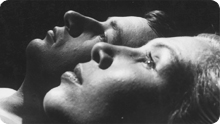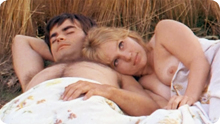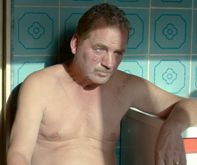Reviewer Ed Farolan

Throne of Blood
(Kumonosu-jo)
Japan 1957. Dir: Akira Kurosawa. 110 min. 35mm
Dates and
Venue 17 - 19 June | The Cinematheque, 1131
Howe Street
There was an applause from the audience in last June 17th's opening of this film, No wonder Orson Welles considered this one of his best films, and T.S. Eliot's favourite. Adapted from Shakespeare's Macbeth, this b/w film of Kurosawa (Rashomon and Seven Samurai) ranks as one of the Japanese master’s finest works and one of cinema’s great Shakespeare adaptations. Transposing the action to medieval Japan, featuring Toshiro Mifune in the Macbeth role as samurai general Washizu, the film combines cinematic pageantry with the traditional Noh and Kabuki theatre elements. Isuzu Yamada, as Washizu’s wife Asaji, is a cold-blooded Lady Macbeth like the Shakesperean, but she plays the role in a low-toned manner unlike the passionate Lady Macbeth. I only noticed two changes in this adaptation: the three witches are substituted by only one character, an evil spirit who prophesizes the rise and fall of Washizu, and the second is the manner of death of our anti-here. I would have wanted to see a samurai sword fight at the end. But from the reaction of the audience, this is an excellent film and one of the best if not the best from Kurosawa.

La Pointe Courte
(Pointe Courte)
France 1954. Dir: Agnès Varda. 89 min. DCP
Dates and
Venue 1 - 5 May | The Cinematheque, 1131
Howe Street
This is the first film of Varda who is considered the "grandmother of avant-garde film" in France. It's loosely based on William Falkner's The Wild Palms and you could notice a lot of influence from Ingmar Bergman: the close up shots, the slow-moving camera, the long dialogues. Today this may appear boring but in the 1950s this was innovative and considered avant-garde.

Bonheure
(Happiness)
France 1965. Dir: Agnès Varda. 80 min. DCP
Dates and
Venue 1 - 5 May | The Cinematheque, 1131
Howe Street
This is a later film of Varda, and I like it more because of the cinematography--the colours of summer and fall, like Monet's paintings. Although others found the amorality of the film shocking, in the 1960s, today amorality is a common thing and people are no longer shocked with incidents of adultery. There were a few claps at the end of the film from the audience during its opening.

One Floor Below
(Un etaj mai jos)
Romania/France/Germany/Sweden 2015. Dir: Radu Muntean. 93 min. DCP
Dates and
Venue 16-21 Apr | The Cinematheque, 1131
Howe Street
The problem with so-called "new wave" directors is that they forget the basics of filmmaking. Take this film, for example, which is supposed to be a "cat-and-mouse psychological thriller", but there were no thrills at all. The director/filmmaker wasted a lot of footage on trivial scenes such as walking the dog and picking up its poo. It wastes time with the son who becomes manic about playing games with his computer and having nightmares about them, instead of focusing on the main issue--the murder of a woman in the first floor of the building. The protagonist is still a remnant of the communist mentality: "I don't care. It's none of my business". Obviously, this apathetic attitude is passed on to the audience who found this film dull and boring.

Second Chance
(En chance til)
Denmark 2014. Dir: Susanne Bier. 105 min. DCP
Dates and
Venue 16-21 Apr | The Cinematheque, 1131
Howe Street
An excellent film by this 2010 Oscar winner/director. Now this is a superb example of what a psychological thriller is about. It leaves the audience sitting at the edge of their seats in every scene, and getting shocked at revelations such as the autopsy of the dead infant. It also has moral and ethical issues that result in punishment, and not apathy. You are punished for your wrongdoing, and that's exactly what happens to the hero, the policeman, as well as the villain, the drug user.

Tokyo Drifter
(Tokyo nagaremono)
Japan 1966. Dir: Seijun Suzuki. 83 min. DCP
Dates and
Venue Feb 20-Mar 12 | The Cinematheque, 1131
Howe Street
Looking back to the 1960s when I was a teenager, I still remember the MOD look and the different colours and styles of dress worn, and indeed, this retro into the 60s reflects the Japanese version of that era. You had Clint Eastwood with his spaghetti westerns and Sean Connery hitting the headlines with James Bond movies. With all this going on, Suzuki does a mish-mash of action, musical numbers (again, perhaps from that Motown influence and Hollywood musicals) and garish colors. This avant-garde filmmaker starts off with b/w cinematography and then continues on with colours reflecting the late 1960s.
Although I find it now a bit corny and passe, it's still an amusing retro of how this Japanese filmmaker steps out of the traditional Japanese mode and injects Western culture into this film.

Carmen from Kawachi
(Kawachi Karumen)
Japan 1966. Dir: Seijun Suzuki. 89 min. 35mm
Dates and
Venue Feb 20-Mar 12 | The Cinematheque, 1131
Howe Street
A take-off on the opera Carmen (including a Japanese rock version of the famous aria “Habanera”), this film is about Carmen from small-town Kawachi who gets gang-raped and goes to the big city (Osaka) to become a prostitute. It's the same sad tale of a woman who gets exploited by different men, but ends up with a lot of money when she returns home to Kawachi. Again, we see a lot of Western influence in this film shot entirely in b/w. There's a picaresque scene that makes fun of pop artists, targetting on Jackson Pollock, where an actor splashes paint on a glass canvas and says, "This is art!"
There's a lot of black humour in this film, one in particular, when a rich lover of Carmen films her surreptitiously, like a peeping tom, as she gets raped. Again, the jocular streak in Susuki is expressed in this film as he satirizes Japanese style Western culture.
©
2016 Ed Farolan
|


